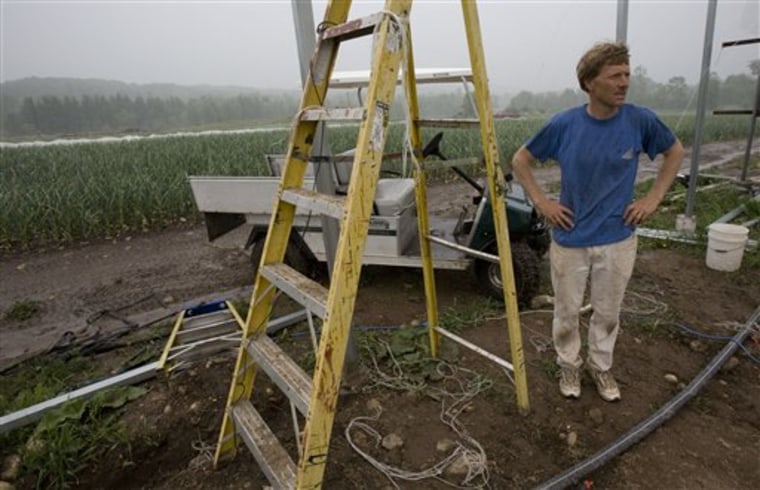Environmentalists recommend buying close to the farm. But actually buying the farm?
A growing number of people around the nation are investing in shares of a local farmer's crop, reducing trips to the supermarket and the cost of shipping food.
"It makes sense that you would save gas on broccoli grown 30 miles away versus California," said Rob Goldman, 53, a doctor from the Milwaukee suburb of Whitefish Bay.
Goldman will participate this summer in a community-supported agriculture program, or CSA. Members buy a share of a farmer's crop, usually for $500 to $600, and receive a box of vegetables and fruits each week during the summer and fall. A box typically feeds three or four people for a week, although many farms offer half-shares for individuals or couples.
The number of CSA farms has grown from about 50 in 1990 to more than 2,000 nationwide, according to a database maintained by LocalHarvest, a California-based group that supports buying locally grown food. The heaviest concentrations are in the Northeast, West Coast and upper Midwest.
Many farmers say they can sell as many shares as they can offer. Elise Margoles, 32, sold the 100 shares she offers at Elysian Fields Farm in Cedar Grove, N.C., in one week and now has a waiting list.
"This is the first time I ever filled up," she said.
More than 700 people showed up at a March fair in Milwaukee that helps match first-time CSA participants with farmers, said Jamie Ferschinger, community program coordinator at the Urban Ecology Center, which hosted the fair. Since then, she has received dozens of calls from people who want to join CSAs but can't find one with shares still available.
The farmer Goldman signed up with, Peter Seely of Plymouth, said he usually sells all of his 500 shares. His CSA serving has grown from 50 shares in 1988, and he's taking more calls than ever this year.
"In general, there has been pretty substantial interest in it," Seely said.
Veggies led to loan for solar power
Goldman lent Seely $1,000 to help put solar panels in his barn. In return, he'll get an extra shipment of root vegetables in December. He probably wouldn't have made the loan if he'd had no relationship with the farmer, he said.
"It's good because you are supporting farmers, and you're sharing some of the risk, and they are better able to manage their farms," Goldman said. "And in the future, that may be important in terms of being able to have a local economy."
The CSAs tend to draw well-off families who can afford to pay more for fresh vegetables and come up with all the money up front. But a growing number of farms are offering installment plans, Ferschinger said, and the rising cost of produce at grocery stores has reduced the price difference.
"It's not a cheap way to buy foods," Goldman said. "But I think the sort of premium you are paying is sort of reduced because food has gone up, vegetables have gone up, and I think a lot of that is trucking it from California."
CSA farmers and members save on gas by dropping off and picking up produce at central locations.
Mary Leciejewski, 21, a senior at Providence College in Rhode Island, helped organize a drop-off for the college community that will be across the street from her apartment.
"Most of the food you get, a meal would travel like 1,600 miles or something," she said. "But the farm we are getting it from is six miles away."
Farmers get stability
CSA farmers reap a number of benefits. With money paid up front, they don't have to take out loans to buy fertilizer and seed or worry about demand and prices at harvest time.
"Starting this CSA was probably one of the smartest moves I ever made," said Ken Dawson of Maple Spring Gardens farm in Cedar Grove, N.C.
He started his CSA five years ago, selling 65 shares at his niece's urging. This year, he sold 157 shares. The program has allowed him to expand his customer base beyond the farmer market where he has sold for 25 years.
"The idea is spreading, and I have no idea how many people we could sign up if we wanted to, probably a lot," Dawson said. "But we're not really in an expansion mode with our farm. We're doing as much as we want to do and are able to sell as much as we want to grow."
